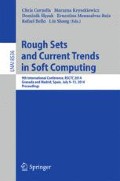Abstract
Libraries represent a focal point of academic life and as such serve also a societal purpose of bringing together people around common themes. This purpose is nowadays enhanced and facilitated by the so-called digital libraries. For this reason, it is necessary to develop tools for helping users to reach decision with a high level of conensus in these virtual environments. The aim of this contribution is to present a tool for reaching consensus in order to minimize the main problems that these virtual environments presents (difficulty of establishing trust relations, low and intermittent participation rates, and so on) while incorporating the the benefits that they offers (rich and diverse knowledge due to a large number of users, real-time comunication, and so on). To do so, the fuzzy linguistic modelling is used to represent the users’ opinions.
Access this chapter
Tax calculation will be finalised at checkout
Purchases are for personal use only
Preview
Unable to display preview. Download preview PDF.
References
Herrera-Viedma, E., López-Gijón, J.: Libraries’ social role in the information age. Science 339(6126), 1382 (2013)
Heradio, R., Fernandez-Amoros, D., Cabrerizo, F.J., Herrera-Viedma, E.: A review of quality evaluation of digital libraries based on users perceptions. Journal of Information Science 38(3), 269–283 (2012)
Heradio, R., Cabrerizo, F.J., Fernandez-Amoros, D., Herrera, M., Herrera-Viedma, E.: A fuzzy linguistic model to evaluate the quality of Library 2.0 functionalities. International Journal of Information Management 33(4), 642–654 (2013)
Herrera, F., Herrera-Viedma, E., Verdegay, J.L.: Direct approach processes in group decision making using linguistic OWA operators. Fuzzy Sets and Systems 79, 175–190 (1996)
Herrera-Viedma, E., Cabrerizo, F.J., Kacprzyk, J., Pedrycz, W.: A review of soft consensus models in a fuzzy environment. Information Fusion 17, 4–13 (2014)
Roubens, M.: Fuzzy sets and decision analysis. Fuzzy Sets and Systems 90, 199–206 (1997)
Ling, K.: E-commerce technology: back to a prominent future. IEEE Internet Computing 12(1), 60–65 (2008)
Baym, N.: Cybersociety 2.0. In: The Emergence of On-line Community, pp. 35–68 (1998)
Ling, K., Beenen, G., Ludford, P., Wang, X., Chang, K., Li, X., Cosley, D., Frankowski, D., Terveen, L., Rashid, A.M., Resnick, P., Kraut, R.: Using social psychology to motivate contributions to online communities. Journal of Computer-Mediated Communication 10(4) (2005)
O’Really, T.: What is web 2.0: design patterns and business models for the next generation of software. Communications & Strategies 65, 17–37 (2007)
Herrera, F., Herrera-Viedma, E., Verdegay, J.L.: A model of consensus in group decision making under linguistic assessments. Fuzzy Sets and Systems 78(1), 73–87 (1996)
Zadeh, L.A.: The concept of a linguistic variable and its applications to approximate reasoning. Part I. Information Sciences 8(3), 199–249 (1975)
Zadeh, L.A.: The concept of a linguistic variable and its applications to approximate reasoning. Part II. Information Sciences 8(4), 301–357 (1975)
Zadeh, L.A.: The concept of a linguistic variable and its applications to approximate reasoning. Part III. Information Sciences 9(1), 43–80 (1975)
Kacprzyk, J., Fedrizzi, M.: Multiperson decision making models using fuzzy sets and possibility theory. Kluwer, Dortdrecht (1990)
Cabrerizo, F.J., Moreno, J.M., Perez, I.J., Herrera-Viedma, E.: Analyzing consensus approaches in fuzzy GDM: advantages and drawbacks. Soft Computing 14(5), 451–463 (2009)
Alonso, S., Herrera-Viedma, E., Chiclana, F., Herrera, F.: A web based consensus support system for group decision making problems and incomplete preferencess. Information Sciences 180(23), 4477–4495 (2010)
Alonso, S., Perez, I.J., Cabrerizo, F.J., Herrera-Viedma, E.: A linguistic consensus model for web 2.0 communities. Applied Soft Computing 13(1), 149–157 (2013)
Harstad, B.: Strategic delegation and voting rules. Journal of Public Economics 94(1-2), 102–113 (2010)
Author information
Authors and Affiliations
Editor information
Editors and Affiliations
Rights and permissions
Copyright information
© 2014 Springer International Publishing Switzerland
About this paper
Cite this paper
Cabrerizo, F.J., Pérez, I.J., Morente-Molinera, J.A., Ureña, R., Herrera-Viedma, E. (2014). A New Consensus Tool in Digital Libraries. In: Cornelis, C., Kryszkiewicz, M., Ślȩzak, D., Ruiz, E.M., Bello, R., Shang, L. (eds) Rough Sets and Current Trends in Computing. RSCTC 2014. Lecture Notes in Computer Science(), vol 8536. Springer, Cham. https://doi.org/10.1007/978-3-319-08644-6_23
Download citation
DOI: https://doi.org/10.1007/978-3-319-08644-6_23
Publisher Name: Springer, Cham
Print ISBN: 978-3-319-08643-9
Online ISBN: 978-3-319-08644-6
eBook Packages: Computer ScienceComputer Science (R0)

